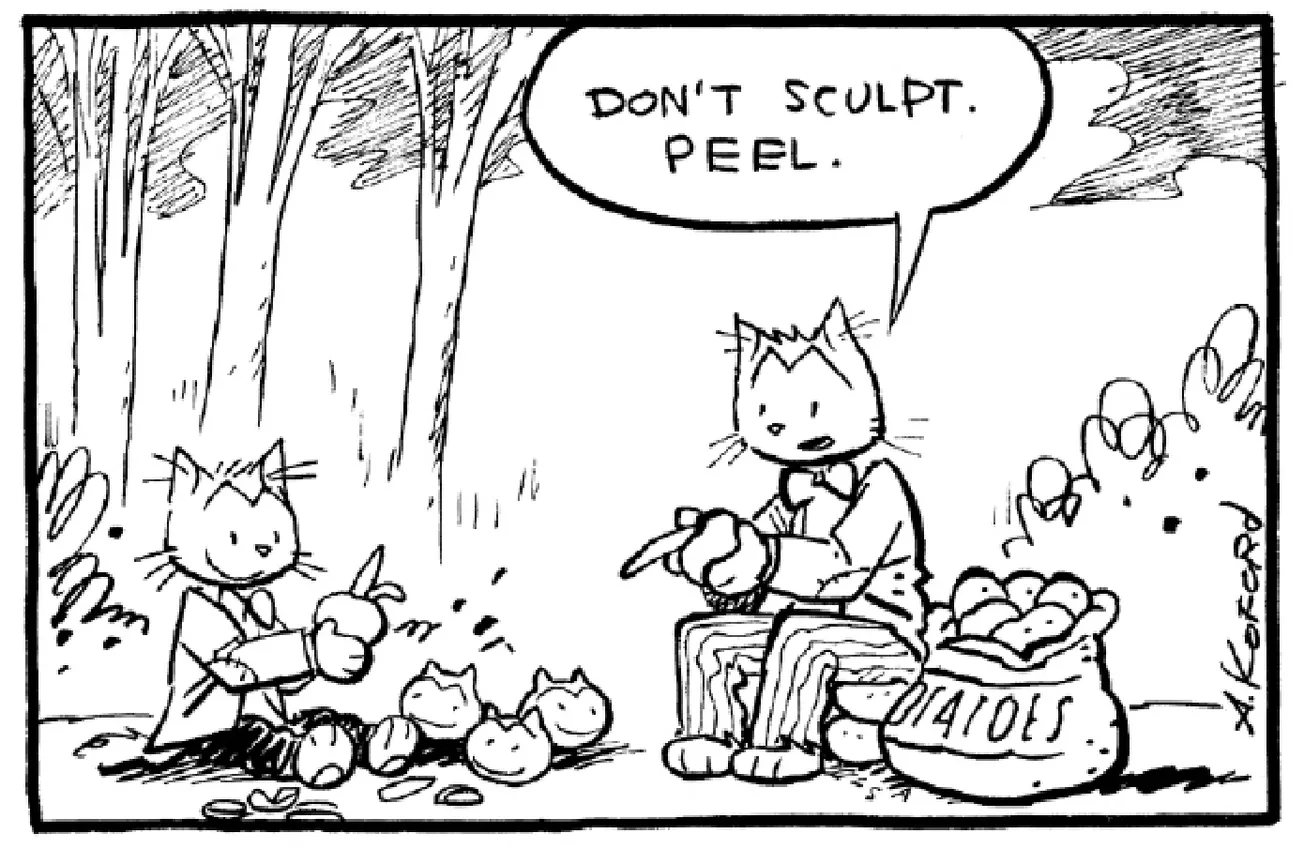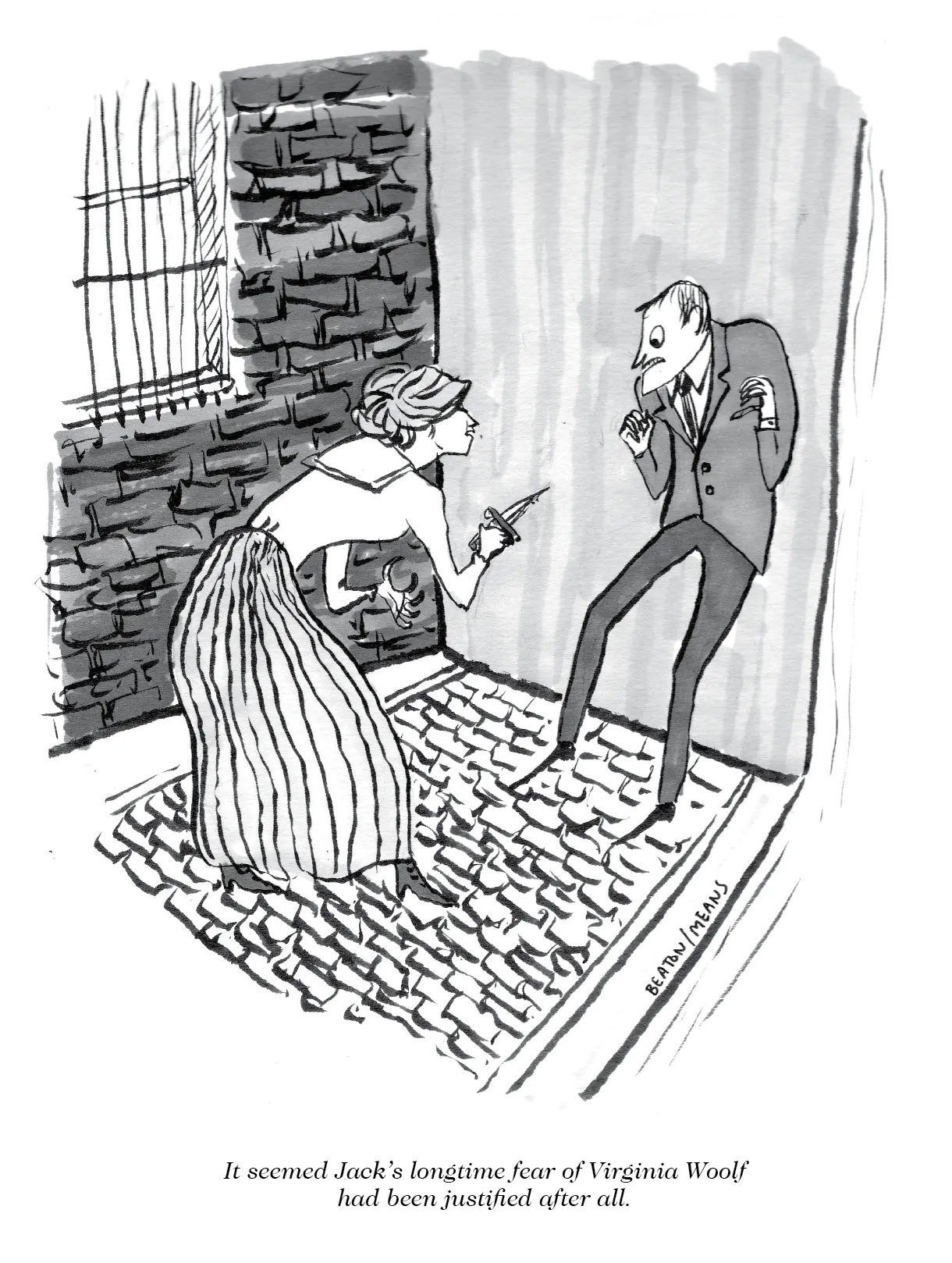Even before my partner Brian McConnachie died January 5, I was pondering the future of The Bystander. In 2021 and ’22, post-pandemic inflation wrecked our super-lean business model; printing now costs us twice as much, and what we sell for $20 should really be $30. And after twenty-eight of these glorious Katalogs of Komedy, each one painstakingly crafted on the wheezing Mac in the corner of my living room, is there anything more, creatively, for me to explore? Not to mention my eyesight; the flashes and colors are entertaining but—to quote a blurry shape I think was my ophthalmologist—“definitely not great.”
When we began Bystander in 2012, I told Alan and Brian my goal was a hundred-year institution. I meant it; but nine years in, the deaths of some of Bystander’s signature contributors—Jack Ziegler, Howard Cruse, Sean Kelly, George Booth, Sam Gross, and of course Brian—had steadily darkened my spirit. As each friend departed, I wondered, “Can I still make the magazine I want to make?”
A certain amount of depression was understandable; but that brought another problem. Comedy people are encouraged to speak any truth…except a boring one. So I kept it all to myself, and what began to smolder inside me around September, flared up into a cold, lightless flame over the Holidays. (Starting this year, I will be razoring out the entire month of December from my calendar, and replacing it with a photocopy of June. June’s my birthday month, I always feel great in June.) Still, as painful as my depression was, it was also extremely obvious. I always thought it was a blessing to be one of the few comedy writers who didn’t need to be depressed to be funny; now I find that when I’m depressed, I don’t even have gallows humor to get me through.
But things are better now, for some very specific reasons, and I am happy to announce that The Bystander will continue. We are raising an endowment to award prizes, fund classes, keep books in print permanently, and pay writers and artists. In addition we are generally reconfiguring the venture, so that I no longer see ITC Caslon 224 Italic whenever I close my eyes. With luck, General Manager Laura Fox can even get back to doing what she does best: baiting strangers into arguing over Spongebob.

The tide began to turn a bit on Christmas Day. In desperate need of holiday cheer, I called up a favorite contributor. I try to do things for others when I’m blue, and this was his first Christmas after a difficult life event. Plus, he always makes me laugh.
He did make me laugh—I believe he called someone a “chode”—but as that chuckle died down, I dropped the bomb. “I think that’s it for The Bystander,” I said. “I’m so tired, my bones feel like lead.”
”And your chode?”
“Leaden, utterly.”
“Oh, that’s serious,” he said. “But c’mon dude—The Bystander’s got to survive.”
“I wish it could,” I said, then told him all the crazy and financially ruinous things I’ve done to keep it going since 2015. “The ironic thing is that Laura almost saved it—all our numbers went ’way up. It was just too late.”
“Man, that sucks,” he said. “But c’mon dude—The Bystander’s got to survive. I know some rich people; let me make some calls.”
“Really?” I was shocked. In prestige publishing, as in the Ivy League, if you ever admit you’re drowning someone hands you an anvil. “You’d do that for me?”
“Of course!” he said. “My stuff’s too dirty for anywhere else.”
“Thank you. From the bottom of my chode.”
• • •
Three days later, another Bystander cartoonist stepped up, this time to help pay for #27 and #28, after my old printer had whalloped me with a surprise bill.
“I’m happy to keep going,” I said, “but I’ve dropped about a hundred grand on this thing. I can’t keep subsidizing it, and I need to know people really care about it.”
“Tell you what,” the cartoonist said, “I’ll pay for half and you pay for the other half. This thing has to keep going. It’s important. I’ll even talk to some rich guys I know.”
More rich guys, love it. “Do you really think Mr. Gotrocks will step in to save a humor magazine?”
“Can’t know until we try. Put together a deck, and I’ll send it around.” Before becoming a cartoonist, this gentleman was an actual businessman, in an actual business, not publishing. “But you can’t be shy. Let’s make our case and see what happens.”
Later that night, he called me up with a brainstorm: get the slide deck in front of people in the cannabis industry. A business where people have a lot of cash, and are baked off their asses? Seemed perfect.
“What if I could make donations to a Bystander Fund tax-deductible?” I asked. “Would that open the wallets?”
“Couldn’t hurt.”
So the next day, I rang up some friends, called in three decades’ worth of favors, and got that done, too.
• • •
It cheered me so much to know that the staffers—the people who make this magazine great, and the reason I started it in the first place—believed that Bystander was worth saving. I began to feel a bit better…and then something happened. My depression, gray and immobilizing, began to feel sharp like grief.
Throughout all this, my wife was wonderful. My parents were wonderful. My friends were wonderful. I knew they loved me whether or not I published the magazine, or even wrote at all. So why did I still want to jump out a window, yelling “Apologies!” all the way down?
I’ve always wanted to be a writer and an editor. I’ve always wanted to run a magazine like The Bystander, and I think I do a pretty good job at it. Sure, the magazine would’ve been loads funnier if I’d done it in 2005, right after Barry Trotter, when the pressure of my chronic illness was crushing me into a dark star. But 2005 Mike would’ve been hell to work with, and most of the people who’ve graced our pages wouldn’t have put up with that. So it all worked out for the best, but…there is no business here anymore, just gentlemen and ladies collecting butterflies. A business is something where, if you succeed at it, you get rich. Until they can pay your rent, clicks don’t count. As Sam Gross said to me, “Exposure? Fuck that. You can die from exposure.”
When I was young and stalking the carpeted corridors of Manhattan, whenever another acerbic lady editor told me “people don’t read comedy” or whatever that afternoon’s excuse was for publishing Jane Austen Visits Downton Abbey For Cats, I would smile and silently reaffirm my belief that print humor and cartooning could still work—if they were good enough.
Thirty years later, those editors had gotten what they’d wanted, which was Julien Fellowes’ personal phone number, and I’d gotten what I’d wanted, which was to publish the greatest comedy writers and artists living today.
But now, if Bystander failed, that could only mean that the idea behind it—that people would still pay for something beautiful, something best—no longer obtained. Did I respect a world like that? Did I want to live in it?
I’m not being dramatic, these are real questions. Put your personal answers, if you have any, in the comments.
We must be honest: books do not exist in America, not like they used to. Nor do magazines and newspapers. And as long as social media is allowed to dominate our attention, none of these forms are coming back. Print takes time and patience, and we have neither. It’s going to be YouTube videos and sad crypto until social media whips up Armageddon.
I miss Old Media; it wasn’t perfect, but it wasn’t a drug. That was part of my grief, too.
When I was a kid, the media was the good guys. It was a noble way to spend your life; they were the ones you could trust; when other authorities failed, they could even dispense a kind of justice. Go watch the last scene of Three Days of the Condor. Now, The New York Times is complicit in the whole Trump thing in a way that it wasn’t in Vietnam or the Pentagon Papers or Watergate. And that’s because today, The New York Times is just another fucking website.
Books, magazines, newspapers—reading these is a quiet, personal act which helps train the brain and incline it towards civilization. Social media, on the other hand—have you ever read about the Opium Wars? Social media is driving our world off a cliff and sooner or later we’re all going to have to quit it cold turkey, or die. (That’s me, too.)
But it ain’t gonna stop until then. If you were a venture capitalist, which would you invest in, journalism, or TikTok? Chewable vitamins, or cocaine?
• • •
For the past several weeks, trudging through Santa Monica’s rainy season, my grief has turned to anger. Was it the coup de grace delivered to Sports Illustrated, a boyhood pleasure I wrote of earlier? Certainly; and also the rackful of zombie brands that used to be magazines I loved: MAD, National Lampoon, National Geographic. It was The Baltimore Sun being bought by a rightwing goon. It was fresh media obits crowding the timeline—The Messenger three weeks ago, VICE three days ago. It was AI, Elon’s Twitter, Zuck’s bunker, and whichever tech billionaire is injecting stuff into his penis and giving us updates. It was another story of a studio dumping a finished film for a tax writeoff. It was Cory Doctorow’s theory of the “enshittification of the internet.” It was my pal getting fired from The Intercept after nine years. But most of all, it was the knowledge that none of this will stop until we stop it.
It was positive developments, too: the emergence of Defector.com and Flaming Hydra, writer’s co-ops that took Bystander’s direct-to-reader-super-lean-and-pass-the-money-through ethos and married it with a much more efficient, much easier digital model. It was Hamilton Nolan’s postulating that government funding is the only hope for journalism—and my certainty that if that model ever takes wing, comedy and especially satire, will not be part of it.
It was, perhaps, a feeling that a lot of people are getting really goddamn fed up.
Enough to support one little ol’ humor magazine, among many other things? We’ll see. I’ll even take Dogecoin—operators are standing by.
• • •
So this week #27 and #28 are being published. My load—and choad—is lightening. We’re working on our deck. I have begun the gargantuan task of loading in every piece of material from all 28 Bystanders into an archive available to our paid Substack subscribers. And—because Substack’s burning through cash like the digital junkie it is—Laura and I are auditioning Ghost to see if it can become our online clubhouse permanently.
I feel better; I’m wearing spiffy ties again, eating Tommaso Muzzi panettone, and looking forward to going East on April 6th to annoy the (100+!) youngsters on The Yale Record. If I’m not exactly sanguine about the media business—and I am not—I have fully embraced my difficult destiny as a literary gent. If that means I have to ghostwrite, or teach, or run a side business specializing in divining rods, so be it. I’ll be republishing all my parodies and novels this year, and may even revivify my Beatles blog Hey Dullblog, if I can squeeze out enough shekels to pay for the hosting. In some tiny but heartfelt ways, the enshittification of the internet stops here.
It may be curtains for literary culture—you know, what George Plimpton was playing against in those Intellivision commercials—along with the internet, politics, and even men’s fine tailoring. But I’ll do my part for as long as I can.
If you’d like to help, get in touch. Donations, remember, are tax-deductible. ◊





